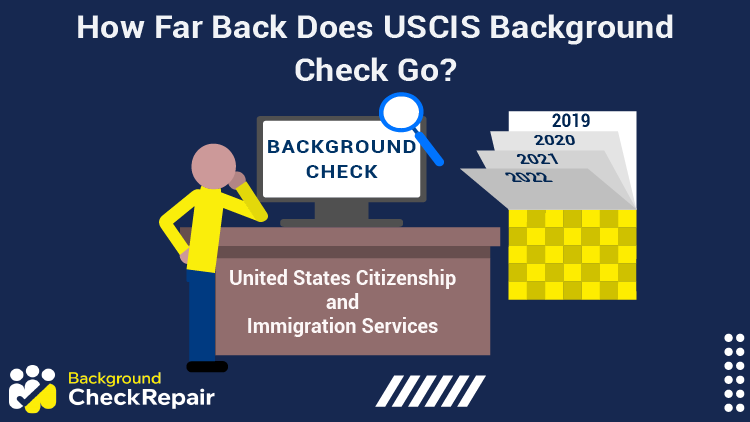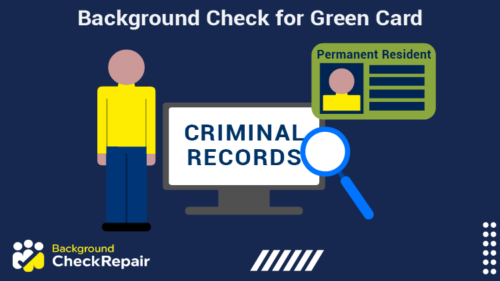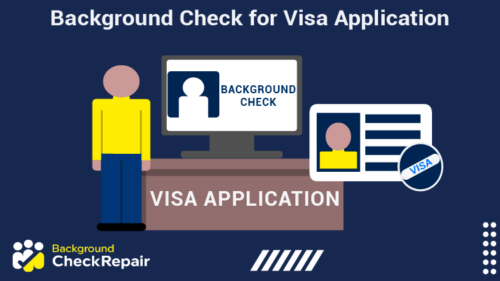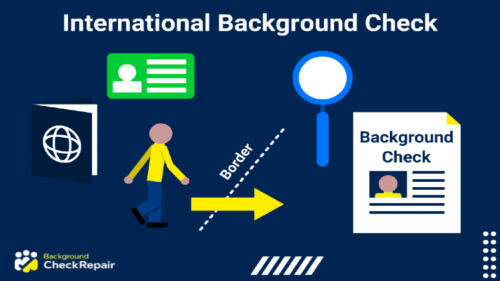
The U.S. immigration process is extremely complicated and many people wonder how far back does USCIS background check go?
Although in most cases the required immigration background checks will cover an individual’s entire criminal history, there are a handful of situations in which this won’t be the case.
Understanding the process for obtaining a permanent resident card for the U.S. can help applicants pass the USCIS criminal history screening, regardless of how far back does USCIS background check go for any given situation.
How Far Back Does USCIS Background Check Go?
When asking how far back does USCIS background check go, the vast majority of background checks performed by the United States Citizenship and Immigration Services will go back forever and uncover the individual’s entire criminal history.
However, individuals should know that the USCIS background check actually involves 3 separate background checks that are performed at various stages of the immigration process.
The FBI fingerprint-based background check that is used as the primary check to screen an individual’s criminal history for a green card does not have any limits on how far it will go back. The FBI database that is used includes data from all over the world and also uses information from international criminal databases, such as those maintained by INTERPOL.1
Besides the FBI background check that is performed for a green card, there is also the Interagency Border Inspection System (IBIS) Name Check.2 Although much of the data uncovered during this check will also be present on the FBI fingerprint check, this check will also use databases that contain information besides criminal histories such as public safety concerns and databases involving individuals that are considered national security risks.
Even though this database is name-based it is still extremely thorough and is the check that immigration officials will use at ports of entry.
Finally, there is the FBI Name check.3 This will also involve information that is contained in the last two checks, however, this search could be seen as being even more thorough.
Rather than just checking a handful of databases that contain information on individuals who are considered dangerous for various reasons, the FBI name check will search every possible database for any kind of information relating to the individual. The check is also performed using various spellings of the individual’s name as well as changing the order of their first, middle, and last names to make the check as thorough as possible.
One aspect of this check that makes it unique is that it is performed manually.
Rather than looking for matches to an individual’s name by entering it into a massive database, an individual at the FBI offices will search each name themselves and examine any matches that are found. Since this system is not automated it will also take by far the longest of any of the other background checks.
For individuals wondering, how long a fingerprint background screening takes or how long an FBI background screening takes, the FBI fingerprint check and the IBIS check are both completed in less than a week in most cases. However, the Name check can take far longer.
Officially the check is supposed to take less than a month to complete, but many individuals have reported waiting several months or even multiple years for their check to be completed.
A number of factors can lead to the check taking much longer than normal, but unfortunately, there is very little that can be done by the individual being checked to help speed up the process or prevent it from taking longer than normal in the first place.
As mentioned, although the majority of USCIS background checks will go back forever there is one small exception that will affect the FBI Fingerprint check.4
Since the check is fingerprint-based, there is the possibility that certain individuals will not be able to provide fingerprints. This is not something that an individual could lie their way out of, rather the USCIS will decide if the individual can not be fingerprinted due to a skin condition or some kind of condition that would prevent their fingerprints from being gathered.
Keep in mind that someone not being able to go to their fingerprinting appointment or similar reasons will not be considered legitimate reasons to not be fingerprinted. Only individuals who are physically incapable of providing fingerprints will be exempt from this process.
Should this be the case, individuals will instead need to provide what is known as a police clearance certificate to the USCIS.
Police Clearance Certificate USA: How Far Back Does USCIS Background Check Go?
A police clearance certificate is what some individuals will use to prove their criminal history instead of the FBI fingerprint background check in certain situations. Although the process is fairly straightforward, it will require a fair amount of effort on the part of the individual who is seeking a green card.
The process will involve the individual gathering a police clearance certificate from every police department where they have lived in the last 5 years. For many individuals, this can be difficult as they might have to visit the police department in person to obtain their criminal records to prove to the USCIS that they have a clear record.
Keep in mind that individuals who are applying for U.S. citizenship via marriage to a current citizen will only need the last 3 years of records in most cases.
Although in most cases the answer to, how far back does USCIS background check go, the police clearance certificate can be seen as an exception.
Should a police certificate be required instead of fingerprints, the USCIS will provide individuals with specific instructions for what information is needed and how to gather acceptable information.
Background Check for Green Card
The background check for green cards is likely the most intimidating part of the immigration process for many individuals and there are a lot of misconceptions about what the check entails, what they are looking for in the check, or what causes a red flag on a background check.
As mentioned, the USCIS background check for green card is mainly looking to assess if the individual poses any kind of threat to the United States or its citizens.
This is done through criminal history checks, employment, and education verification to ensure the individual is of good moral character, and a variety of other checks to ensure the individual does not have ties to a foreign adversary or criminal organization.
Individuals will first need to decide how they intend to qualify for a green card. In most cases, this will be through what is known as family immigration for individuals who have relatives that are already U.S. citizens or through work immigration for individuals who are seeking employment in the United States.5,6
As far as what the background check entails, individuals can expect the criminal history check to be the main core of the background check process.
There is a fairly long list of disqualifiers that will make an individual ineligible to obtain a green card and often to even enter the United States. Although this list may seem scary, many of the disqualifiers involve crimes against humanity such as committing genocide, or recruiting child soldiers.7
Although there are also disqualifiers involving serious crimes like rape, individuals with low-level crimes should not have any major issues obtaining their green card.
Many individuals will be applying for a green card with a petitioner. A petitioner is essentially a U.S. citizen that is advocating for someone to become a citizen on employment or family grounds.
A common question when it comes to this situation is, does USCIS do background check on petitioner, and the answer is yes.
Petitioners will also have a criminal history check performed on them in order to determine if they are eligible to be a petitioner at all. As far as the disqualifiers for being a petitioner, all disqualifying crimes are outlined in the Adam Walsh Act.8
Most of the disqualifiers are related to sex crimes and crimes against children in an effort to prevent human trafficking via legal immigration.
Background Check After Green Card Interview
Many people will be surprised to hear that there is another background check after green card interview, however, this is standard for the immigration process.
The initial check basically acts as a preliminary screening to ensure there are no obvious criminal records that would prevent the individual from entering the U.S. such as convicted murderers or individuals who have committed crimes in the United States on a previous visit.
Many people will want to know the next steps and will be wondering, what happens after the USCIS background check after N-400 interview, fortunately, the next step is to simply wait.9 As mentioned the FBI Name check is the last background check that is performed and also the one that takes by far the longest.
Individuals will simply need to wait patiently for communication from the USCIS about their application being approved and to make an appointment to take the Oath of Allegiance.10
Although the USCIS makes some distinctions between the different kinds of green card applications that are available, the background check will be the same for each kind of application. The background check after I-485 interview will be the same one that is performed after the N-400 interview.11
How Long Does USCIS Background Check Take?
When it comes to how long does USCIS background check take there are a couple of things to consider. Although the official USCIS processing times for background checks is less than a week for the first two checks, and less than a month for the final check, the actual process will often take far longer.
In some cases, it can be several months or years before all of the checks have been completed due to backlogging.
Many individuals who are checking their USCIS case status might see their USCIS security check pending or might see a message such as your case is currently delayed because the required security checks are still pending. Neither of these messages is a cause for concern and the most likely reason for any USCIS background check delay is simply due to the FBI having too many applications to check.
Can You Get a Green Card With a Felony?
Those hoping to immigrate with criminal records will be rightly concerned about can you get a green card with a felony? Although this is possible it often makes things a little bit more difficult.
The FBI has a thorough list of disqualifications and exemptions that individuals should look through to see if any of these will apply to them.7 Should this be the case, seeking an exemption will be the only option when it comes to being eligible to immigrate.
USCIS Background Check for Employment History
Many people are surprised to hear that there is a USCIS background check for employment history. However, this is not a major cause for concern as the check is mainly focused on determining if the individual has actually worked where they claim to and to ensure that they have not worked for an organization that could be considered a criminal organization or a company that has ties to a foreign adversary.
Background Check for Immigration
There can be some confusion about the background check for immigration compared to the green card background check and the USCIS background check. All of these will refer to the same background check that is performed on individuals seeking to become citizens which must be done through the USCIS.
Many individuals might have heard that individuals will apply through the U.S., embassy, although visa interviews and other aspects of the process are performed at the U.S. embassy, the process itself is governed by the USCIS.
Although the USCIS is in charge of making the final determination and awarding green cards, they do not actually perform the criminal history checks themselves. Instead, the FBI performs the background checks for the USCIS, which is why it is often referred to as an FBI background check for immigration, and performs the Name check and other criminal background check for immigration purposes.
USCIS Background Check for Citizenship
The USCIS background check for citizenship is far less intimidating than many individuals think. Although the U.S. immigration policy is more complicated than many countries, most individuals that are eligible to apply will be able to pass the background check without many issues.
The interview is also a cause for concern, but this is mostly performed to help verify the information that the individual has already supplied and to get answers on record about various security threats.
Being asked about criminal organizations or terrorism may raise red flags for some individuals and lead them to believe that they are under above-average scrutiny, however, these questions are fairly standard.
Individuals can research the details of what determines eligibility as well as various resources to help smooth out the process by using the resources provided by the USCIS.12
How Far Back Does USCIS Background Check Go?
There is a lot of misinformation when it comes to how far back does USCIS background check go, as many people will have heard that it only goes back 3 or 5 years. However, almost all USCIS background checks will go back forever.
The only exception is individuals that are physically incapable of providing fingerprints, in which case they will need a police clearance certificate instead.
For most individuals, there is a lot to consider and a ton of paperwork to gather when it comes to starting the green card process to immigrate to the United States. Although the background check is a common cause for concern and questions like, how far back does USCIS background check go, maybe cause anxiety, the process is not as intimidating as it may seem.
Frequently Asked Questions About How Far Back Does USCIS Background Check Go





